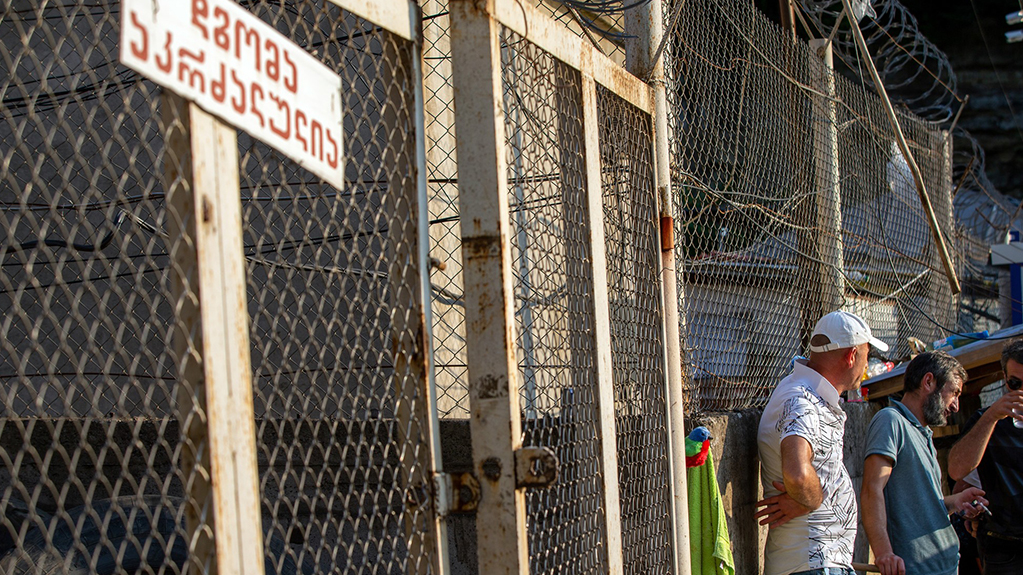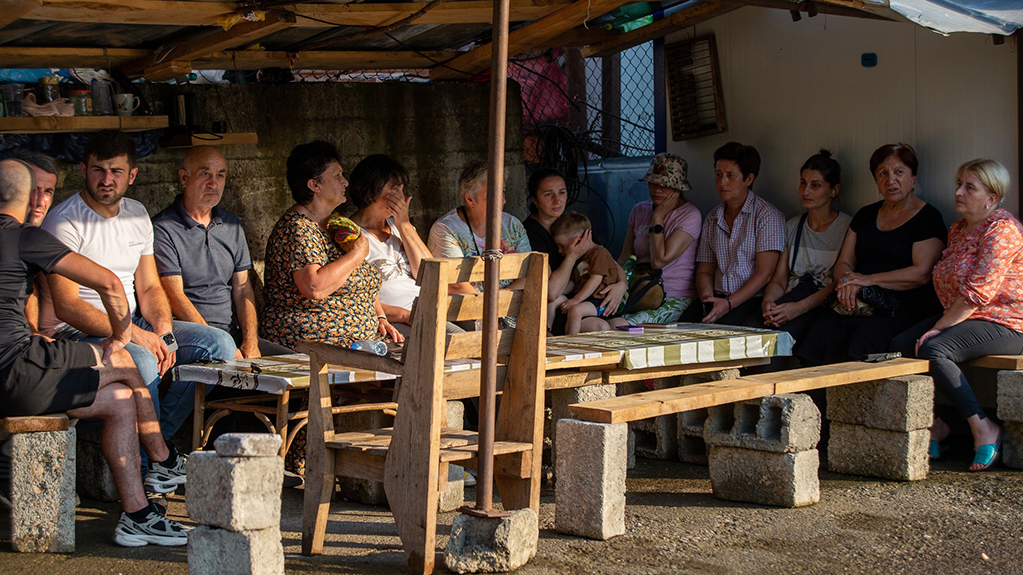The Sachkhere District Court has prohibited the residents of Shukruti village in Chiatura, who have been picketing the Korokhnali and Shukruti mines for 153 days, from continuing their protest in this manner. The judge's ruling is to be enforced immediately. Georgian Manganese LLC has sued the affected residents, whose homes were destroyed as a result of the company's ore mining activities, and whose yards have developed large cracks. Georgian Manganese is suing the residents of Shukruti, who participate in the ongoing protest daily, and is demanding compensation of 5.5 million GEL from them.
News
The court's decision was delivered to the participants of the rally today. According to the judgment, on August 8, Magharoeli LLC, the exclusive contractor of Georgian Manganese, filed a claim with the Sachkhere District Court. The license granted to Magharoeli authorized it to extract manganese. The company accuses the protest participants of causing financial damage and demands payment of 5 563 481 GEL from them.
"Since March 14, 2024, the defendant individuals have been picketing and blocking the Korokhnali and Shukruti mines, as well as the entrances to underground areas belonging to Georgian Manganese LLC. The defendants have arbitrarily shut down the ventilation system, thereby halting the supply of clean air to the underground facilities. As a result, the Korokhnali and Shukruti mines, along with the areas within them, have ceased operations. The blockage of the mine entrances is an unlawful act carried out by the individuals named as defendants. Specifically, they stand at the site entrances and physically prevent the company's employees from entering the areas and carrying out mining operations. These unlawful and criminal actions are disrupting the work of Magharoeli LLC, causing significant damage to Magharoeli LLC, Georgian Manganese LLC, and the state budget," the company stated in its lawsuit. Additionally, the company submitted an application to the court requesting the use of security measures, stating that "the security measure will serve both to minimize the harm caused and to prevent the defendants from incurring criminal liability. It will also allow the company to settle the dispute without a substantive hearing through a court-approved settlement."
Judge Ivane Kipiani reviewed and granted the company's request to prohibit the participants of the protest from interfering with the manganese mining operations of LLC Magharoeli within one day. "The court believes that the enterprise's inability to fulfill its function negatively impacts not only the economic situation of the enterprise itself but also the enterprise as a whole, including its social and material responsibilities. There is a clear danger that the defendants will continue to interfere," the ruling stated, giving the protestors five days to appeal.
According to Vladimer Kutateladze, the lawyer representing the affected Shukruti residents and a lawyer from the Civil Activities Center, the decision is illegal and will definitely be appealed.
"As is evident from the ruling, the sole claim of LLC Magharoeli is to impose a liability of 5 563 481 GEL on the people participating in the protest.
It is completely unclear how restricting the residents from protesting and standing at the mine entrances will ensure the enforcement of the decision and the payment of millions of GEL claimed from them.
This illegal ruling is effective immediately and will not be suspended by appeal, and it will take months to review and resolve the appeal. During this period, the people of Shukruti will face entirely unjustified restrictions on their constitutionally guaranteed rights to freedom of assembly, association, and expression.
This ruling is a repressive measure disguised as legal action, aimed solely at intimidating the population and forcing them to comply with the company's demands," the lawyer stated.
Giorgi Neparidze, one of the organizers of the protest near the Korokhnali and Shukruti mines, announced that the protest will be moved to the home of Bidzina Ivanishvili, the honorary chairman of Georgian Dream, in the village of Chorvila in Sachkherie.

Before Magharoeli, the contractor of Georgian Manganese LLC, filed another lawsuit against the residents of Shukruti:
- the managers of Georgian Manganese tried to persuade the protest organizers to end the demonstration through various proposals, but they refused.
- The company then filed a complaint with the police against the protest participants. The prosecutor's office charged three of the protest organizers - Giorgi Neparidze, Malkhaz Labadze, and Roman Megrelishvili - with criminal liability under Article 226, which involves disrupting the operations of an enterprise by organizing group actions. The crime is punishable by a fine or up to three years of imprisonment. None of them plead guilty. The same judge, Ivane Kipiani, granted bail to all three defendants as a preventive measure. The Court of Appeals in Kutaisi denied the request to lift the preventive measure.
- The contractor companies of Georgian Manganese dismissed two protest participants - Jumber Tsutskiridze and Giorgi Bitsadze. Tsutskiridze was an excavator operator, and Bitsadze worked in a manganese washing plant. Tsutskiridze appealed the unlawful dismissal order in court.
- In May, LLC Magharoeli sued the protest participants in court, demanding that they be prohibited from "carrying out actions that hinder the operation of the mine.” The people of Shukruti will not interfere with the company even if it continues to extract manganese beneath their homes. The participants in the protest have been deprived of their privately owned houses and plots of land for four years "upon first request" and have handed them over to the company for manganese mining. The defendants are required to hand over these plots to the company in a vacant state - meaning the owner must demolish and clear any structures, such as houses or storage units, from the land. Until these demands are met, the contractor for Georgian Manganese has sought to seize the property of the residents, citing concerns that locals might refuse to sell their private property in the hazardous living area, which could complicate disputes with new owners. However, the court did not grant the request for property confiscation. The defendants have submitted a lengthy response to the lawsuit, but the court has yet to begin hearing it.
Georgian Manganese claims that some of the protest participants have already received compensation for the damage or demolition of their houses. In reality, the company paid this amount to the victims as an advance. The agreement, reached in 2021 after a long protest, a hunger strike, and self-harm by several participants, stipulated that Georgian Manganese would invite experts from the National Bureau of Forensic Expertise to assess the damage in Shukruti. Now, the company agrees to pay damages only based on the assessment of auditors it has hired. The protest participants believe that Georgian Manganese is withholding the expert bureau's report because the actual damage is much greater than what their audit indicates.
If the company compensates the affected Shukruti residents based on the objective calculations of independent experts, other affected residents from neighboring villages may also initiate disputes, which the company is keen to avoid.
According to Giorgi Neparidze and other protest participants, this is why, even in 2021, the company insisted that the terms of the damage compensation contract be kept confidential and that lawyers from non-governmental organizations should not participate in the negotiation process.
For the past seven years, the Ministry of Environmental Protection has appointed a special state manager to oversee Georgian Manganese Ltd., due to the creation of an ecological disaster-like situation in Chiatura that required urgent correction. However, under this special state management regime, the ecological condition in Chiatura has significantly deteriorated and is now in a critical state.
On this topic - Chiatura – Zone of a Disaster [Investigation]
In December 2023, the license to mine manganese in Chiatura was challenged for the first time in 17 years. Eighty-seven-year-old Guram Gaprindashvili is the only person in Chiatura who has dared to initiate a legal dispute over this issue and is demanding the cancellation of the license for open-pit mining. Guram Gafrindashvili's interests are being represented by the Civil Activities Center. The Tbilisi City Court has accepted the lawsuit but has not yet scheduled the first hearing.















